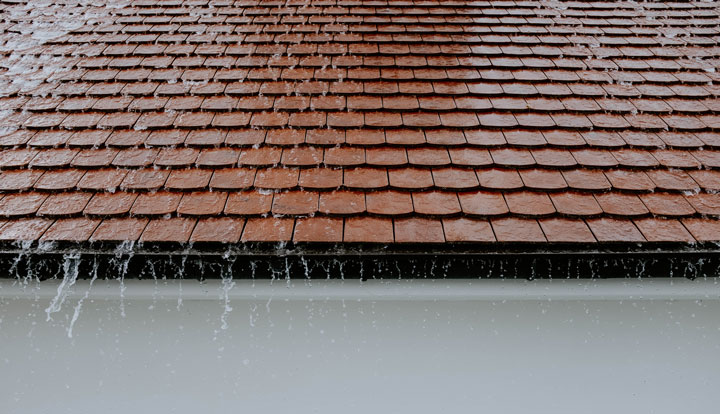
A few weeks ago, I posted a series of articles detailing the uses for, and construction of rain barrels. As I scanned the comments later, along with noticing quite a few folks pointing out my error of switching oxygen for nitrogen, I saw a few people mentioned that, in some sections of the country, the collection of rainwater is illegal. Flabbergasted, I looked it up and, turns out, depending on where you live, it may well be restricted. As a result, and to avoid steering anyone adrift of the law, I’ve compiled everything I can find on the legality, and illegality of collecting rainwater… The fact that, that’s a serious sentence, and not some Onion-esque attempt at satire makes my head spin, but I digress.
Background
As it turns out, rainwater collection restrictions have a long history. They date back to the California Gold Rush of 1848 to 1855. Many miners used hydraulic pressure to “dig” mines, and thus created pathways to divert water that wasn’t on their land. This led to the first set of “first come, first serve” laws on the collection of rainwater from “natural sources.” Nowadays, the primary reason given for rainwater regulation is to protect your health. As mentioned in the previous articles, collected rainwater is not suitable for human consumption, without some serious filtration or other purifying process. A secondary reason, in drier areas, is the rainwater will not find its way to water sources if it’s collected. In other states, its collection is incentivized. Whatever the case on the state level however, there can always be restrictions on the local level, so make sure to check any ordinances that may be in place.
State Restrictions
While there are several thousand too many localities for us to cover here, see below for the best information I can find on state incentives and restrictions. Please keep in mind of course, I ain’t a lawyer, and laws in this country can change with the breeze, so just use this as a general guideline.
Alabama
Alabama has no restrictions on rainwater collection.
Alaska
Alaska has no restrictions on rainwater collection.
Arizona
Arizona has no restrictions on rainwater collection.
Arkansas
Rainwater may be collected, but only for non-drinking purposes. The collection system must also be designed by a licensed engineer to conform to Arkansas Plumbing Code.
California
Rainwater can be collected, but its use must abide by requirements set forth by the California State Water Resources Control Board.
Colorado
Rainwater may be harvested, but only in two barrels with a maximum capacity of 110 gallons. Harvested water must also not be transported to a different property.
Connecticut
Connecticut has no restrictions on rainwater collection
Delaware
Delaware has no restrictions on rainwater collection. The Delaware Department of Natural Resources and Environmental Control offers incentives for collecting rainwater, such as discounted rain barrels.
Florida
Florida has no restrictions on collecting rainwater, and sometimes offers incentives for collection through the Water Saving Incentive Program.
Georgia
Rainwater may be collected for non-potable uses, provided it complies with local county requirements.
Hawaii
Hawaii has no restrictions on rainwater collection.
Idaho
Rainwater may be collected off roofs and the ground, provided it had not yet entered a waterway.
Illinois
Rainwater collection is legal for non-drinking purposes, as long as the system complies with Illinois Plumbing Code.
Indiana
Indiana has no restrictions on rainwater collection.
Iowa
Iowa has no restrictions on rainwater collection.
Kansas
Rainwater for domestic use is allowed in Kansas without a permit. For commercial irrigation, or any lawn or garden above two acres, a permit must be acquired through the Kansas Department of Agriculture.
Kentucky
Kentucky has no restrictions on rainwater collection.
Louisiana
Louisiana has no restrictions on rainwater collection.
Maine
Maine has no restrictions on rainwater collection.
Maryland
Maryland has no restrictions on rainwater collection, and some incentives are offered at the county level.
Massachusetts
Massachusetts has no restrictions on rainwater collection.
Michigan
Michigan has no restrictions on rainwater collection.
Minnesota
Minnesota has no restrictions on rainwater collection.
Mississippi
Mississippi has no restrictions on rainwater collection.
Missouri
Missouri has no restrictions on rainwater collection.
Montana
Montana has no restrictions on rainwater collection.
Nebraska
Nebraska has no restrictions on rainwater collection.
Nevada
Rainwater collection for domestic, non-drinking use is legal and permissible.
New Hampshire
New Hampshire has no restrictions on rainwater collection.
New Jersey
New Jersey has no restrictions on rainwater collection, and offers resident incentive programs.
New Mexico
New Mexico requires permits for some forms of rainwater harvesting systems, but does offer incentives for green building that harvests rainwater.
New York
New York has no restrictions on rainwater collection.
North Carolina
Rainwater collection is regulated at the state level for non-potable uses such as outdoor irrigation and plumbing.
North Dakota
North Dakota has no restrictions on rainwater collection.
Ohio
Rainwater collection is allowed for both potable and non-potable uses. The only regulations existing are for cisterns collecting water for domestic use.
Oklahoma
Oklahoma actively encourages the collection of rainwater, through the Water for 2060 Act.
Oregon
Rainwater collection is regulated by the Water Resources Department–only roof sources can be used, and water can be used for drinking with a proper filtration system.
Pennsylvania
Pennsylvania has no restrictions on rainwater collection.
Rhode Island
Rhode Island has no restrictions on rainwater collection, and offers tax incentives.
South Carolina
South Carolina has no restrictions on rainwater collection.
South Dakota
South Dakota has no restrictions on rainwater collection.
Tennessee
Tennessee has no restrictions on rainwater collection.
Texas
Texas has no restrictions on rainwater collection, and offers some tax incentives.
Utah
Collection is regulated by the Division of Water Rights. A maximum capacity of 2,500 gallons is allowed, and collectors must register for approval with the aforementioned Division.
Vermont
Vermont has no restrictions on rainwater collection.
Virginia
Virginia has no restrictions on rainwater collection, and encourages it through the Alternative Water Supply Assistance Fund.
Washington
Washington requires rainwater be collected on your own property, using a structure that has at least one other purpose. Some cities offer further incentives.
West Virginia
West Virginia has no restrictions on rainwater collection.
Wisconsin
Wisconsin has no restrictions on rainwater collection.
Wyoming
Wyoming has no restrictions on rainwater collection.
A humble homesteader based in an undisclosed location, Lars Drecker splits his time between tending his little slice of self-sustaining heaven, and bothering his neighbors to do his work for him. This is mainly the fault of a debilitating predilection for fishing, hunting, camping and all other things outdoors. When not engaged in any of the above activities, you can normally find him broken down on the side of the road, in some piece of junk he just “fixed-up.”

Tom Kelley says
How could rainwater be bad for your health? Could it have something to do with the collection containers?
The Commish says
Manatee County in Florida sells a Rain Barrel Kit for $30 which includes a 55 gal blue drum, debris screen, brass spigot, all PVC fittings & directions for assembly. Barrel to be hooked up to your roof downspouts.
john says
Don’t forget about local municipalities also may have their own restrictions on rainwater harvesting, on top of a state.
Not So Free says
Rainwater doesn’t belong to the state. It comes from God.
Kevin says
I.M.O. Water, especially fresh-water, will become an even more precious resource! I don’t understand why any state or local jurisdiction would restrict residential, rainwater collection! ESPECIALLY in drought areas/years! To see neighborhoods using the chlorinated, treated, public water system for watering yards, trees, plants, & even washing cars seems crazy! Especially considering how easy & cheap cost it is to do! I lived in an area that every summer, every homeowner, had to place a “soaker” hose around the perimeter, or the ground would literally dry, crack, & shrink, until the concrete foundation would actually CRACK & cause extensive structural damage! To prevent costly water bills, where we were billed TWICE! (Once for water usage & secondly for sewer charge BASED ON AMOUNT OF WATER USAGE!) I used rain-barrels from roof gutter down-spouts, & swimming pool filter backwash water hose. My yard stayed green, & foundation remained moist, even in driest times! Otherwise, if I hadn’t collected the rainwater when it rained it would have mostly ran off property into city stormwater system.. As I stated, this is just my opinion, I’m sure there are others that disagree, or further substantiated reasons why there’s restrictions. Thanks!
RIC CARTER says
The “First in time, first in right” concept actually came from English law.
George Wroclawski says
Please correct NJ.
Lars Drecker says
All fixed! Thanks for catching that typo!